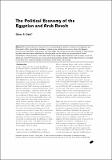| dc.contributor.author | Dahi, Omar S. | en |
| dc.date.accessioned | 2016-01-06T15:59:16Z | |
| dc.date.available | 2016-01-06T15:59:16Z | |
| dc.date.issued | January 2012 | en |
| dc.identifier.citation | Dahi, O., S. (2012) The Political Economy of the Egyptian and Arab Revolt. IDS Bulletin 43(1): 47-53 | en |
| dc.identifier.issn | 1759-5436 | en |
| dc.identifier.uri | https://opendocs.ids.ac.uk/opendocs/handle/20.500.12413/7460 | |
| dc.description.abstract | This article advances a framework for understanding the political economy of the Egyptian and Arab revolts. After almost three decades of implementing neoliberal economic policies, the Egyptian economy was nevertheless stagnating in the early 2000s and political unrest was increasing. In response two key policy decisions were undertaken by the ruling elite, one to embark on a programme of further liberalisation and privatisation in the hope of attracting foreign direct investment and the other to use the global war on terror framework as a means of repressing internal dissent. While these decisions ‘succeeded’ in the short term, they also created the conditions which led to the uprisings. | en |
| dc.format.extent | 7 | en |
| dc.publisher | Blackwell Publishing Ltd | en |
| dc.relation.ispartofseries | IDS Bulletin Vol. 43 Nos. 1 | en |
| dc.rights.uri | http://www.ids.ac.uk/files/dmfile/IDSOpenDocsStandardTermsOfUse.pdf | en |
| dc.title | The Political Economy of the Egyptian and Arab Revolt | en |
| dc.type | Article | en |
| dc.rights.holder | © 2012 The Author. IDS Bulletin © 2012 Institute of Development Studies | en |
| dc.identifier.doi | 10.1111/j.1759-5436.2012.00289.x | en |

